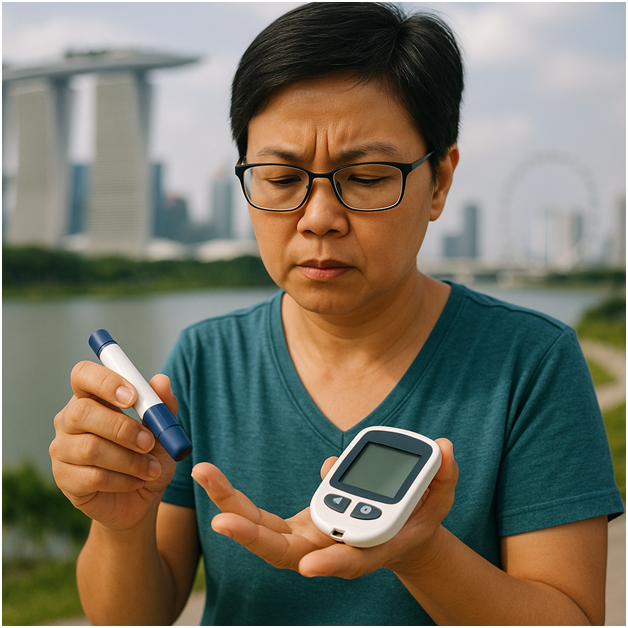Vision Care for Diabetics: Understanding the Link between Diabetes and Cataracts in Singapore

As a diabetic patient in Singapore, it’s essential to be aware of the increased risk of developing cataracts, a common eye condition that can cause vision loss if left untreated. At JL Eye Specialists, we want to educate you on the link between diabetes and cataracts, and provide you with practical tips on how to reduce this risk. In this article, we’ll delve into the relationship between diabetes and cataracts, discussing how high blood sugar levels can affect the eyes, and offer guidance on precautions diabetic patients can take to protect their vision.
The Link Between Diabetes and Cataracts
People with diabetes are at higher risk of developing cataracts at a younger age. High blood sugar levels can cause changes in the eye’s lens, leading to clouding and faster cataract formation. Diabetic patients are also more prone to posterior subcapsular cataracts, which progress faster and affect vision more severely. This is because high blood sugar levels can damage the blood vessels in the eyes, leading to inflammation and oxidative stress, which can accelerate cataract formation.
How High Blood Sugar Affects the Eye
Glucose enters the eye’s lens and gets converted into sorbitol, which attracts water and causes the lens to swell. This process leads to lens opacity, distorted vision, and eventual cataract formation. Poorly controlled diabetes can also damage retinal blood vessels, compounding vision issues. It’s essential for diabetic patients to maintain stable blood glucose levels to prevent these complications.
Signs and Symptoms to Watch Out For
If you’re a diabetic patient, it’s crucial to be aware of the signs and symptoms of cataracts, which can include:
- Cloudy or blurry vision
- Glare or halos around lights
- Double vision in one eye
- Frequent prescription changes
- Difficulty seeing at night
Importance of Regular Eye Screenings
Diabetics should undergo annual comprehensive eye exams, including a dilated retinal exam and lens check. Early detection allows for timely treatment, which can prevent vision loss. Regular eye screenings can also help detect other eye conditions, such as diabetic retinopathy, which can cause vision loss if left untreated.
Cataract Surgery Considerations for Diabetic Patients
Cataract surgery is generally safe and effective for diabetics, but requires careful planning. Blood sugar levels must be well-controlled before surgery, and additional care may be needed to prevent inflammation or delayed healing. Pre-existing diabetic retinopathy or macular edema may affect surgical outcomes, so it’s essential to discuss these conditions with your eye specialist before surgery.
Intraocular Lens (IOL) Choices for Diabetics
Monofocal IOLs are often recommended for simplicity and reliability. Multifocal or premium IOLs may not be ideal if diabetic eye disease is present, as it may limit visual clarity. An eye specialist will recommend the best IOL based on individual eye health and lifestyle. It’s essential to discuss your options with your eye specialist to determine the best course of treatment.
Post-Surgery Care for Diabetics
After cataract surgery, it’s essential to monitor blood sugar closely to support healing and prevent infections. Use prescribed anti-inflammatory and antibiotic drops diligently, and attend all follow-up appointments to monitor for complications. By following these steps, you can ensure a smooth and successful recovery.
Lifestyle Tips for Prevention and Vision Protection
To reduce the risk of developing cataracts, diabetic patients can follow these lifestyle tips:
- Maintain stable blood glucose levels
- Eat a balanced, antioxidant-rich diet
- Avoid smoking and excessive alcohol
- Wear UV-protective sunglasses
- Stay active and follow your diabetes care plan
By following these tips and staying informed about the link between diabetes and cataracts, you can take control of your eye health and reduce the risk of developing cataracts. At JL Eye Specialists, we’re committed to providing the best cataract surgery in Singapore, and our experienced surgeons are dedicated to helping you achieve optimal vision health.
If you’re a diabetic patient in Singapore, don’t hesitate to contact us to schedule a comprehensive eye exam and discuss your options for cataract surgery. Our team is here to support you every step of the way, and we’re committed to providing the best possible care for your eyes.
In conclusion, diabetes and cataracts are closely linked, and it’s essential for diabetic patients to be aware of the risks and take steps to protect their vision. By maintaining stable blood glucose levels, following a healthy lifestyle, and undergoing regular eye screenings, you can reduce the risk of developing cataracts and ensure optimal vision health. At JL Eye Specialists, we’re here to support you every step of the way, and we’re committed to providing the best possible care for your eyes.






